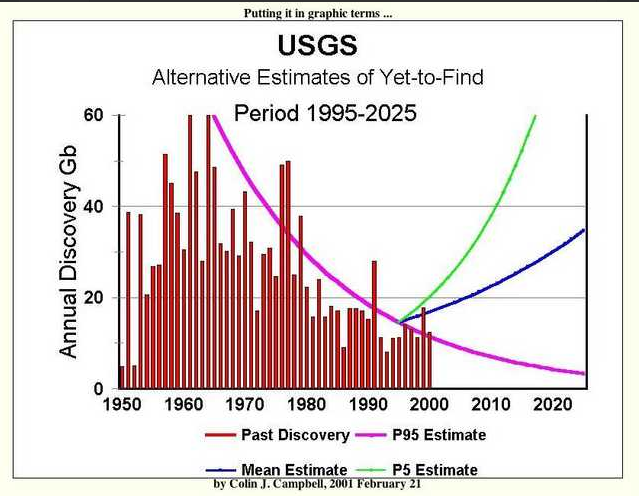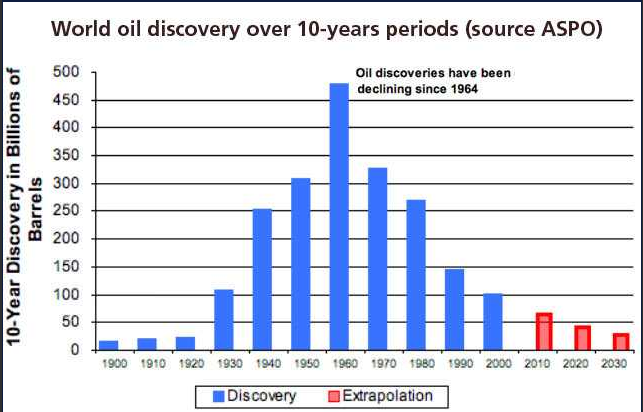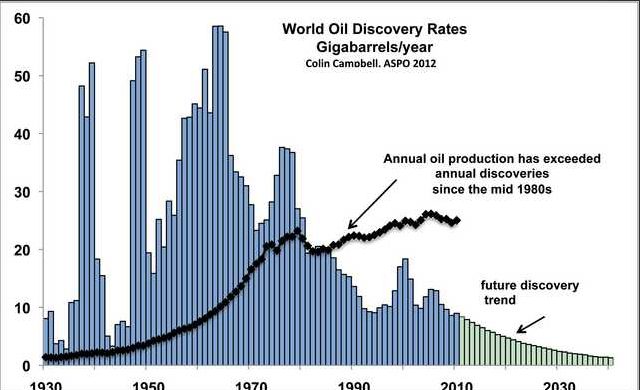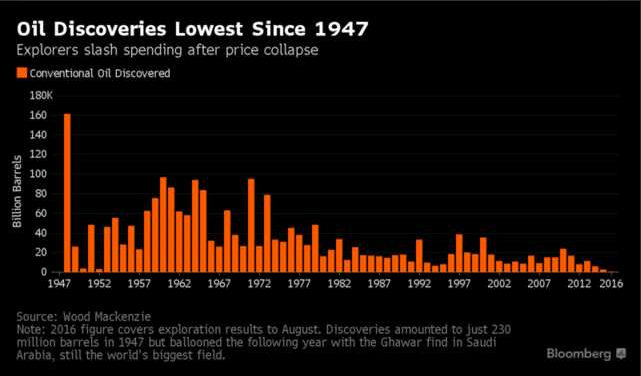So I decided not to title these posts under any heading, they will more than likely digress very quickly anyway, consider it ‘Meta’s Z/Acc Series’ if you have to, they will all be loosely held together under the themes of collapse, decline, decay and you-seriously-thought-this-was-going-to-last.
I’m starting with Peak Oil, mainly because it’s a post I sort of want to get out of the way. Not that I don’t enjoy reading about Peak Oil, but it’s been done to death and basically people are in one of 3 camps: Don’t know about it (Normies), know about it and ignore/refuse it (sunk cost) or know about it and accept it. As you can imagine, I’m in camp 3, but there’s a few things to note about Peak Oil which aren’t often brought to the fore by collapse-centric thinkers, so I’ll try come at this from at least a slightly unique angle.
“Let me explain something to you. The sun throws a certain amount of energy onto this planet, we turn it into food, clothing, shelter etc. It supports an amount of us and it took 30,000 years for that amount to become 1 billion. Then we found a way to use ancient sunlight, sunlight trapped in oil and coal, we started to live off that, what happened? In just 130 years our population doubled, the next billion took 30 years, the 4th billion has taken just 14. So here’s the question, what do you think is going to happen when that oil and coal runs out in say, 100 years? When there’s 10 billion living on a planet that can support only 1!”
“I think we’re going to tear each other to shreds…”
“At last, someone with an ounce of fucking brain. Malaria…the only disease that needs curing is us.” – Utopia
I’ll be honest, they hammed up Philip Carvel’s character just enough to make him seem maniacal and often untrustworthy, yet, his underlying premise holds true. And no, this isn’t a Malthusian ‘thing’, it’s an oil thing. I’m not massively concerned about ‘how many can be supported’, I’ve seen the average person (many times in fact), we most definitely don’t need more. The point here is that the fundamental fuel of our civilization is/are fossil fuels. Products which have accumulated over hundreds of thousand of years and are now being extracted and barrelled at a rate of 80,000,000 barrels per day (here). Nothing compares to this stuff, literally nothing, with regard to its combination of energy, versatility, transportability, energy output and ease of storage.
“But Meta, I only use my car, surely I don’t use that much oil…it isn’t that fundamental, right?”
(Apologies for the table chart)
| Solvents | Diesel fuel | Motor Oil | Bearing Grease |
| Ink | Floor Wax | Ballpoint Pens | Football Cleats |
| Upholstery | Sweaters (that explains the itchy sweater I have at home) | Boats | Insecticides |
| Bicycle Tires | Sports Car Bodies | Nail Polish | Fishing lures |
| Dresses | Tires | Golf Bags | Perfumes |
| Cassettes | Dishwasher parts | Tool Boxes | Shoe Polish |
| Motorcycle Helmet | Caulking | Petroleum Jelly | Transparent Tape |
| CD Player (do people still have these?) | Faucet Washers | Antiseptics | Clothesline |
| Curtains | Food Preservatives | Basketballs | Soap (that explains why soap doesn’t clean oil off your hands) |
| Vitamin Capsules | Antihistamines | Purses | Shoes |
| Dashboards | Cortisone | Deodorant | Footballs |
| Putty | Dyes | Panty Hose | Refrigerant |
| Percolators | Life Jackets | Rubbing Alcohol | Linings |
| Skis | TV Cabinets | Shag Rugs | Electrician’s Tape |
| Tool Racks | Car Battery Cases | Epoxy | Paint |
| Mops | Slacks | Insect Repellent | Oil Filters |
| Umbrellas | Yarn | Fertilizers | Hair Coloring |
| Roofing | Toilet Seats | Fishing Rods | Lipstick |
| Denture Adhesive | Linoleum | Ice Cube Trays | Synthetic Rubber |
| Speakers | Plastic Wood | Electric Blankets | Glycerin |
| Tennis Rackets | Rubber Cement | Fishing Boots | Dice |
| Nylon Rope | Candles | Trash Bags | House Paint |
| Water Pipes | Hand Lotion | Roller Skates | Surf Boards |
| Shampoo | Wheels | Paint Rollers | Shower Curtains |
| Guitar Strings | Luggage | Aspirin | Safety Glasses |
| Antifreeze | Football Helmets | Awnings | Eyeglasses (I thought they were made from glass) |
| Clothes | Toothbrushes | Ice Chests | Footballs |
| Combs | CD’s & DVD’s | Paint Brushes | Detergents |
| Vaporizers | Balloons | Sun Glasses | Tents |
| Heart Valves | Crayons | Parachutes | Telephones |
| Enamel | Pillows | Dishes | Cameras |
| Anesthetics | Artificial Turf | Artificial limbs | Bandages |
| Dentures | Model Cars | Folding Doors | Hair Curlers |
| Cold cream | Movie film | Soft Contact lenses | Drinking Cups |
| Fan Belts | Car Enamel | Shaving Cream | Ammonia |
| Refrigerators | Golf Balls | Toothpaste (Yuck) | Gasoline |
“Fuck.”
According to the IEA current deposits are declining at a rate of 6.7% per annum. Therefore within 10 years existing deposits will give us only half their current energy output. Unless of course new deposits are found.
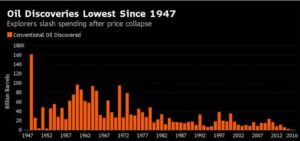
“Fuck.”
“if these predictions are correct – and numerous studies seem to corroborate them – between 2011 and 2016, we are going to lose the equivalent of 18 million barrels per day. Now, some recently discovered deposits give us, at the moment, a bonus of 7.6 million barrels per day. But that still leaves a gap of 10.4 million barrels per day. And this is only the case if the economy remains stationary – zero growth. If, one the other hand, we can expect 3 percent growth, that makes 13 million barrels per day that we shall lose. If growth is 4 percent, that makes 14 million barrels; if 5 percent, 15 million. And if we boost the economy in the Chinese fashion, reaching 10 percent, we shall be losing 20 million barrels per day.” – Survive – The Economic Collapse, Piero San Giorgio.
If we look at Hubbert’s Peak Theory we can see the general curve of oil discovery, through – roughly – to the present day drop in production, extraction and discovery.
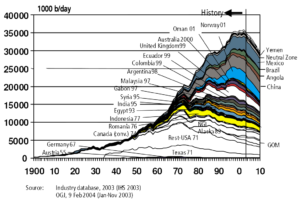
The beauty of Hubbert’s Peak Theory is that, on a fairly rough timescale, you can equate one side of the curve to its respective reflection in time. That is, if you look at the peak and see that around the year 2000 the peak was at its absolute highest point. Thus, 30 years prior and 30 years after the year 2000 will roughly be the same, or (and you’d best already be clutching your pearls for this); the amount of oil we’ll be producing in 2030 will be the same as 1970. Anyone here who studied math or economics at a high school level is now most likely sweating. We’ll be producing the amount of oil needed in 1970 for the amount of people there will be in 2030. The declining phase is much longer that the time passed between the start of production and its peak. I theorize this is because of high prices, rationing or simply inability to acquire any from elites etc.
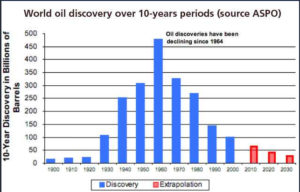
As shown by the graph above discoveries are at an – almost – all time low – why? Because once the oil boom was well underway we of course targeted the easiest sources of oil first, where the oil – quite literally – shoots out of the ground. Whereas currently the cost to extract a barrel of oil – in relation its inherent energy output – is –
“Back in the 1920’s, oil was paying off at 100-to-1,” said Zencey. “It took one barrel of oil to extract, process, refine, ship and deliver 100 barrels of oil. That’s a phenomenal rate of return. If you work out the percentage, that’s a 10,000 percent rate of return.” But that’s not the rate of return today. Now, conventional oil production worldwide pays off at about a 20-to-1 ratio. And in Canada, where the oil comes from tar sands, it’s closer to 5-to-1. ” – (Link) (This is now on average, 3-to-1)
“Since 1980, we have been consuming four barrels of oil for every new one we have discovered.” – Survive The Economic Collapse.
Let me take a very quick outline from ol’ John Michael Greer (JMG) to succinctly cover ‘peak oil’:
- The world’s oil reserves are finite
- We’ve already used close to half the total recoverable oil on the planet
- We’ve pumped more oil than we’ve discovered every year since 1964
- Production at most currently producing oil fields is declining
- New fields and alternative sources such as tar sands are barely filling the gap
- The situation is more likely to get worse than better in coming decades
JMG, Conspiracy Theories
Is this the ‘end of oil’? No. It’s the end of cheap oil. Oil isn’t simply going to go away, those last few remaining dregs wont actually be dregs at all…there will be a lot of oil left under the Earth. But, the means and energy cost to extract it – bar some amazing new invention (‘They’ll think of something’ fallacy) – will be far greater than the energy of the oil, hence, no company is going to bother extracting the stuff. So what will this mean? Well, I imagine that in very rational terms oil prices will just keep increasing until eventually many people either A. Make sacrifices elsewhere and continue their oil-based lifestyles, B. Re-model their lives around the expense of driving everywhere, or C. Collapse now and avoid the rush, let me expand on this.
Want to get ahead of peak oil? Stop going on your shitty holidays. No one gives a shit that you went to some tourist-trap sweat-pit in the Mediterranean and ate some shrimp, no one cares about your fancy 3L BMW, or your dumb excursions around the country every other weekend, nor do they care about your idiotic plastic trinkets that you amass in place of a personality, drop all this shit and live how the large majority of humanity used to…within your means. Walk or bike to work. Only replace things that are literally broken beyond repair. On that note, learn to fix things. For now, drive an old, reliable, economic car. Get your clothes from charity shops, or…and hey isn’t this novel, look after your stuff! Look after your health. Help people, it’s what we used to do, it’s called cooperation.
“To accept that and act on the knowledge, though, is to hear the words the statue of Apollo said to Rainier Maria Rilke: Du muss dein leben andern, “You must change your life.”” – JMG, Blame it on Gilgamesh
Some of you might be thinking “But Meta, isn’t the act of having children one of the clearest ways to increase your carbon footprint by 8x?” Why yes, yes it is. And? What sort of weird argument is that? Don’t continue humanity because things are going to get tough, it doesn’t sit right with me. Also, if your first thought when thinking about having children is their ‘carbon-footprint’ well I think you’ve got your priorities wrong. Also, and this is the big also, you can bring your children up in a non-Western middle class way. You don’t have to drive them to school in an SUV, feed them processed shit and give them toys every week.
Oh, you feel bitter because your parents – and potentially grandparents – got all that nice stuff and you didn’t? Well here’s the skinny on that. It was a fucking anomaly. The average Western binman lives, quite literally, the life of the average Empire of antiquity (bar the power). Also, stop attempting to mirror your lives to the previous generation’s, there’s never been a correct or ‘good’ generation, by and large none of them were ‘great’, there’s a few outliers in terms of average etiquette and temperament, but other than that it’s all romantic conservatism. Also, have you seen their lives? They suck. All they focus on is things. Ok, this is getting close to Chris McCandless’ nostalgia for authenticity etc. but hey, it’s true. New car, new clothes, games consoles, holidays, jobs, qualifications etc. A massive ensemble of practically useless shit, entirely void of substance. There’s a reason boomers harped on about CVs so fucking much, it makes it easier for them to see if you’re worth having as a friend.
A note on the insane amount of oil that is used in America:
“If the average American used only as much energy per year as the average European, America would be exporting oil, not importing it.” – JMG, Managing Decline
Imagine though, seriously, by 2030 the entire system of Western urbanized transport – inclusive of distribution chains – is going to be brought to its knees, why? Because we didn’t check to see how much fuel we had, we didn’t think ahead. Because here’s the real effect that super cheap oil had on our society for the past 100 years:
“for the first (and probably only) time in history, it was cheaper to build a machine to do almost everything than to have a human being do it.” – JMG, After the Prosthetic Society
We just wont have that possibility anymore, good ol’ humans will be back to get things going again. Except this time it will be a mass of humans thrown into quite the predicament, the large majority of Western men – nor their fathers – no longer have the skills needed to do almost anything practical. Shit, I know of at least 10 ‘fully grown, over 30 years of age adults who can’t cook…grown people who cannot feed themselves. Imagine ever thinking, just for a second, that such a situation was in anyway normal.
Read More

